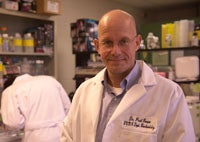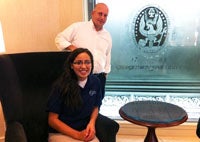Incubator for Growing Scientific Minds

Posted in GUMC Stories
 Paul Roepe, Ph.D., likes to pay it forward. Just as his teachers gave him time and attention, Roepe likes to mentor students who want to work with him.
Paul Roepe, Ph.D., likes to pay it forward. Just as his teachers gave him time and attention, Roepe likes to mentor students who want to work with him.
And it isn’t just a few. Over the last two decades, Roepe, a professor of biochemistry and cellular and molecular biology, and professor of chemistry, has compiled a four-page single-spaced page of students who have worked in his laboratory: 102 total, 80 at Georgetown. And they aren’t all college, graduate, or postgraduate M.D./Ph.D. students. Seven came to him in high school, seeking to enter national science competitions. His current high school mentee is examining the toxic effects of chemicals used in dry cleaning clothes for the annual Intel® Science Talent Search®.
Roepe only needs the list to keep in touch with the students. Mentoring does not earn him extra pay or contribute to promotion. The reward, he says, comes from collaborating with extremely bright students, instilling in them the love of science. “My personal philosophy is that doing science is such a privilege that I have an obligation to give back – to pay forward,” he says.
 Roepe says that he has deliberately put together a laboratory with an unusually ambitious interdisciplinary environment, which makes it possible for him and the scientists in the lab to work with many different kinds of students. He studies malaria and specifically anti-malarial drug resistance. He moved his laboratory from Memorial Sloan-Kettering Cancer Center to Georgetown 15 years ago because D.C. was the small epicenter of research on antimalarial drug resistance. Roepe was able to set up faculty appointments on both the university and medical center sides, and his lab consequently drew students interested in biology, infectious diseases, and genetics, as well as chemistry and physics.
Roepe says that he has deliberately put together a laboratory with an unusually ambitious interdisciplinary environment, which makes it possible for him and the scientists in the lab to work with many different kinds of students. He studies malaria and specifically anti-malarial drug resistance. He moved his laboratory from Memorial Sloan-Kettering Cancer Center to Georgetown 15 years ago because D.C. was the small epicenter of research on antimalarial drug resistance. Roepe was able to set up faculty appointments on both the university and medical center sides, and his lab consequently drew students interested in biology, infectious diseases, and genetics, as well as chemistry and physics.
Roepe’s research has been generously funded by the National Institutes of Health for the past 20 years and, like every lab, Ph.D. and postdoctoral students conduct much of the day-to-day work. In Roepe’s mind, that offers these researchers, who will set up their own laboratories eventually, a chance to teach others about what they do.
“I mentor the students, but I also assign younger students to a Ph.D. researcher because I want those researchers to know how to teach real live science,” he says. “It is nothing like teaching in a lecture where experiments work every time.
“In a real research lab, there is a good chance an experiment will not work. Then a student has to step back and revise their hypothesis and method,” Roepe says. “A lab is where the rubber meets the road, and it is a fabulous experiment for students.”
The “science of life” …
Katherine Kelley, M.D., couldn’t agree more. “It was thanks to Dr. Roepe that I was able to see the beauty in biochemistry, that it really was the science of how life works.”
Kelley, a second-year pediatric resident at Indiana University, met Roepe when she was a sophomore at Georgetown. She wasn’t sure if she wanted to become a physician or a medical researcher, and by working with Roepe, she realized she could do both.
Kateri DuBay, now a post-doc at Columbia University, says “without Dr. Roepe welcoming me in his lab, I would not be where I am today. His excitement about, and broad ways of approaching research questions, provided a fantastic example of how to think about scientific problems.”
She was interested in getting involved in research as a Georgetown freshman, and so she asked Roepe if she could do something in the lab. “He gave me some test tubes to practice opening and closing without contaminating them with my skin — an important skill in biochemistry labs — and told me once I’d mastered that skill … to come by and do some lab dishes occasionally.”
So she went home and practiced and came back a few weeks later to start working. And while Roepe was joking about the dishes, DuBay did learn to feed malarial parasites with human blood during her first semester in the lab.
Tyler Bennett, Ph.D., joined Roepe’s lab in 2001 in pursuit of a doctorate in chemistry. Bennett says Roepe was a real team leader. “He conducted weekly team meetings and was always available to personally meet with each graduate student to review results and discuss potential research solutions. He fostered an atmosphere of teamwork and collaboration,” he says.
Bennett, now the government deputy program manager for a $138 million project developing a next generation influenza therapy, says he counts Roepe as a personal friend who “to this day, offers advice and guidance.” DuBay says she stays in touch from Berkley, seeking Roepe’s advice when making crucial career decisions.
Lexy Dantzler already plans to be a biochemistry/molecular biology major even though she is only a junior in high school. Dantzler has been working with Roepe on the submission she plans to make to the upcoming Intel International Science and Engineering Fair and to the Siemens Competition in Math, Science & Technology.
Dantzler is quantifying the chemical perchloroethylene in dry cleaned clothes from Washington, D.C.-area dry cleaners, and so far, she has already had one scientific publication, and stories on her work have appeared on page one of The Washington Post and in a segment on “Living on Earth” on National Public Radio.
“I have learned more from him than I ever could have imagined I could learn from someone,” Dantzler says.
Besides Dantzler, Roepe mentored six other high school Intel students who all made it as either finalists or semi-finalists.
He says he just supplies an incubator to the brilliant and fertile minds he sees at all levels – high school to post-doctoral.
“Fewer kids may be going into science than before, but the ones who want to come into my lab really want to do science,” he says. “They are among the best of the best, and I am just glad that I can expose them to a real laboratory. That changes their life – and mine, too.”
By Renee Twombly, GUMC Communications
(Published May 30, 2012)
